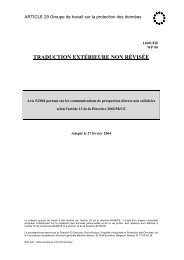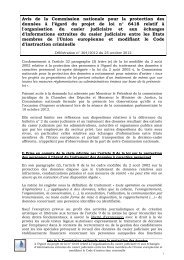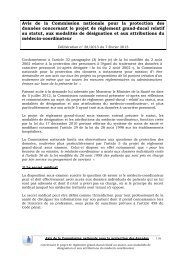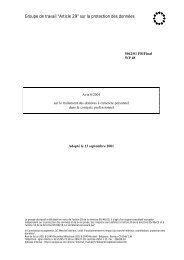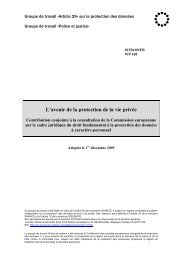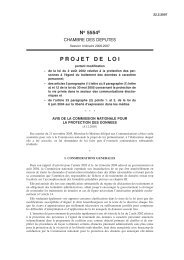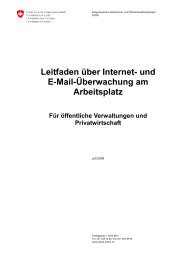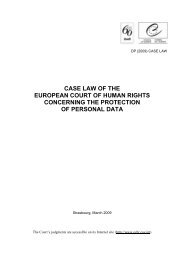case law of the european court of human rights concerning the ...
case law of the european court of human rights concerning the ...
case law of the european court of human rights concerning the ...
You also want an ePaper? Increase the reach of your titles
YUMPU automatically turns print PDFs into web optimized ePapers that Google loves.
10. The Court found that <strong>the</strong> legislation in question has an aim that is legitimate under paragraph 2<br />
<strong>of</strong> Article 8, namely <strong>the</strong> safeguarding <strong>of</strong> national security and <strong>the</strong> prevention <strong>of</strong> disorder or crime. It<br />
<strong>the</strong>n went on to consider whe<strong>the</strong>r <strong>the</strong> means adopted remain within <strong>the</strong> bounds <strong>of</strong> what is necessary<br />
in a democratic society in order to achieve that aim.<br />
11. (a) The Court took notice <strong>of</strong> <strong>the</strong> fact that "democratic societies nowadays find <strong>the</strong>mselves<br />
threatened by highly sophisticated. forms <strong>of</strong> espionage and by terrorism, with <strong>the</strong> result that <strong>the</strong><br />
State must be able, in order effectively to counter such threats, to undertake <strong>the</strong> secret surveillance<br />
<strong>of</strong> subversive elements operating within its jurisdiction". It had <strong>the</strong>refore to be accepted that "<strong>the</strong><br />
existence <strong>of</strong> some legislation granting powers <strong>of</strong> secret surveillance over <strong>the</strong> mail, post and ,<br />
telecommunications is, under exceptional conditions, necessary in a democratic Society in <strong>the</strong><br />
interests <strong>of</strong> national security and/or for <strong>the</strong> prevention <strong>of</strong> disorder or crime".<br />
(b) Although recognising that <strong>the</strong> Convention leaves to Contracting States a certain discretion as<br />
regards <strong>the</strong> fixing <strong>of</strong> <strong>the</strong> conditions under which <strong>the</strong> system <strong>of</strong> surveillance is to be operated, <strong>the</strong><br />
judgment continues: " ... this does not mean that <strong>the</strong> Contracting States enjoy an unlimited discretion<br />
to subject persons within <strong>the</strong>ir jurisdiction to secret surveillance. The Court, being aware <strong>of</strong> <strong>the</strong><br />
danger such a <strong>law</strong> poses <strong>of</strong> undermining or even destroying democracy on <strong>the</strong> ground <strong>of</strong> defending<br />
it, affirms that <strong>the</strong> Contracting States may not, in <strong>the</strong> name <strong>of</strong> <strong>the</strong> struggle against espionage and<br />
terrorism, adopt whatever measures <strong>the</strong>y deem appropriate!” "The Court must be satisfied that,<br />
whatever system is adopted, <strong>the</strong>re exist adequate and effective guarantees against abuse."<br />
12. In <strong>the</strong> light <strong>of</strong> <strong>the</strong>se considerations, <strong>the</strong> Court <strong>the</strong>n examined <strong>the</strong> functioning <strong>of</strong> <strong>the</strong> system <strong>of</strong><br />
secret surveillance established by <strong>the</strong> contested legislation. The judgment notes in particular that:<br />
- according to that legislation, a series <strong>of</strong> limitative conditions have to be satisfied before a<br />
surveillance measure can be ordered ;<br />
- strict conditions are laid down with regard to <strong>the</strong> implementation <strong>of</strong> <strong>the</strong> surveillance measures and<br />
to <strong>the</strong> processing <strong>of</strong> <strong>the</strong> information <strong>the</strong>reby obtained ;<br />
- while "in a field where abuse is potentially so easy in individual <strong>case</strong>s and could have such harmful<br />
consequences for democratic society as a whole, it is in principle desirable to entrust supervisory<br />
control to a judge”, <strong>the</strong> two supervisory bodies instituted by <strong>the</strong> legislation “may, in <strong>the</strong><br />
circumstances <strong>of</strong> <strong>the</strong> <strong>case</strong>, be regarded as enjoying sufficient independence to give an objective<br />
ruling”;<br />
- <strong>the</strong> fact <strong>of</strong> not informing <strong>the</strong> individual once surveillance has ceased cannot itself be incompatible<br />
with Article 8 since it is this very fact which ensures <strong>the</strong> efficacy <strong>of</strong> <strong>the</strong> measure.<br />
13. The Court accordingly found no breach <strong>of</strong> Article 8.<br />
[Paragraphs 39 to 60 <strong>of</strong> <strong>the</strong> judgment.]<br />
C. Article 13<br />
14. The Court <strong>the</strong>n examined <strong>the</strong> <strong>case</strong> under Article 13 which guarantees that everyone whose <strong>rights</strong><br />
and freedoms as set forth in <strong>the</strong> Convention are violated shall have an effective remedy before a<br />
national authority. The Court found, inter alia, that:<br />
13



